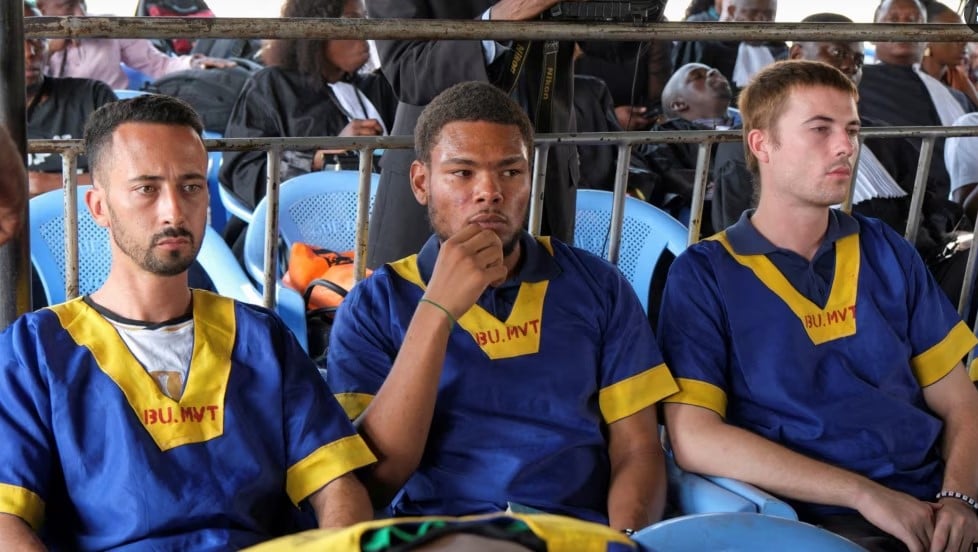Prime
Teenage mothers reaping big from black soldier flies

Ms Mellisa Tushabe and her child sort black soldier fly larvae at the harvest collection centre in Bugoma,Kalangala District, on July 13. PHOTO | DAVID SEKAYINGA
What you need to know:
- Black soldier flies maggot-like larvae, locally known as enfenke, are an alternative feed for chicken, pigs and fish.
A year ago, Ms Mellisa Tushabe, a resident of Banda Village in Mugoye Sub-county, Kalangala District, used to rely on washing people’s clothes in the village where she earned about Shs20,000 daily. This could barely cater for all the 19-year-old’s basic needs.
A school dropout and a teenage mother, Tushabe says her fortunes changed after venturing into farming of black soldier flies.
Black soldier flies’ maggot-like larvae, locally known as enfenke, are an alternative feed for chicken, pigs and fish.
“I had failed to provide for my child with the money I was earning from washing people’s clothes. I decided to join black soldier fly larvae farming, where I earn up Shs70,000 weekly. I am now able to save some money, look after myself and my child,” she says.
“My vision is to work harder and be able to earn more than 200,000 a week,” she adds.
Tushabe’s story mirrors the economic transformation other teenage mothers in the sub-counties of Bujumba and Mugoye in Kalangala District, are going through.
Ms Imelda Nakiryoowa, another black soldier fly farmer in Buyovu Village, Bujumba Sub-county, says 16 teenage mothers in her sub-county and another 17 in Mugoye Sub-county have embraced the project.
“Young girls and first-time mothers were finding it difficult to get food, others could not cater for their children. However, I am happy that they can now harvest at least 25 kgs [of black soldier fly larvae] per week, earning between Shs50,000 and Shs70,000 a week. This is really promising,” she said.
Ms Josephine Nsanji Sekitoleko, a project beneficiary in Bujumba Sub-county, says their biggest challenge is the availability of cellulase pretreated palm decanter cake, which is used to feed black soldier fly larvae. The decanter cake is supplied by Oil Palm Uganda Ltd from both Bukuzindu and Bwendero mills where oil palm is extracted.
In farming, black soldier flies are locked up in a place, and supplied with decaying substances placed under tiny pieces of timber that have spaces where flies lay their eggs.
“They only supply to us 12 tonnes of the decanter a month yet we need 262 tonnes. We appeal to Oil Palm Uganda Ltd, through Ssese Oil Palm Growers Comparative, (SOPAGCO) to increase decanter availed to us for the effectiveness of this project,” she says.
Mr Tonny Kigunddu, the manager of Ragu farms, which is promoting the rearing of black soldier flies in Kalangala, says farmers are organised into units, with each unit comprising 20 households.
“Each unit is given grammes of eggs and decanter (oil palm residues) to look after them for 45 days until they turn to larvae and pupa stages. They then harvest and sell to them,” he says.
He, however, says much as more residents are embracing black soldier rearing, they do not have enough start-up eggs to give them, a challenge that has forced some farmers to abandon the project all together.
“We have only 131 households because of our limited capacity to produce enough eggs for all our farmers. We need three kilogrammes of eggs every week to sustain the three sub-counties where we operate, but we can only supply half of what is required,” he says.
He explains: “One gramme of eggs produces between 2.5 and three kilograms of black soldier fly larvae. If we gave 1kg of eggs to every farmer, we would reap about two tonnes of black soldier fly larvae every week from our farmers.”
According to available records at Ragu farms, farmers started earning between Shs10,000 and Shs14,000 per week at the start of the project in 2022.
However, after gaining more skills through training sessions, they now earn between Shs60,000 and Shs150,000 per week.
In a bid to increase the black soldier fly egg supply, the Rotary Club of Kampala Ssese Islands has since donated Shs10m to the farm to help it expand the hatchery.
Ms Irene Nabayunga, the outgoing president of Rotary Club of Kampala Ssese Islands, says they want many residents to benefit from the project.
“A total of 650 people are directly benefiting from this project in six villages of Kalangala Town Council and the sub-counties of Mugoye and Bujumba. We want this project to benefit at least 24,000 people, especially women, youth and our teenage mothers,” she says.
Other benefits
To boost individual savings of members, teenage mothers have come up with their own savings and credit scheme, Black Soldier Fly Famers Saving and Cooperative Credit Society. With 100 active members, in a period of two years, members have so far saved Shs10 million.




